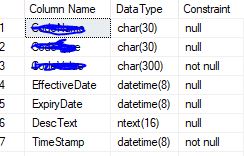Throwing another way to tackle the problem in SQL server.
My little script here should return the Column Name, Data Type, Is Nullable, Constraints, and Indexes Names.
You can also include any additional columns such as precision, scale...
(You will need to replace the DB name, Schema Name, and Table Name with yours)
.The Columns are returned in the same order you would get from 'select * from table'
USE DBA -- Replace Database Name with yours
DECLARE @SCHEMA VARCHAR(MAX)
DECLARE @TABLE_NAME VARCHAR(MAX)
DECLARE @SCHEMA_TABLE_NAME VARCHAR(MAX)
SET @SCHEMA = REPLACE(REPLACE('[SCHEMA NAME]', '[', ''), ']', '')--Replace Schema Name with yours
SET @TABLE_NAME = REPLACE(REPLACE('[TABLE NAME]', '[', ''), ']', '') --' Replace Table Name with yours
SET @SCHEMA_TABLE_NAME = @SCHEMA + '.' + @TABLE_NAME;
WITH SchemaColumns
AS (
SELECT C.COLUMN_NAME,
IS_NULLABLE,
DATA_TYPE,
CHARACTER_MAXIMUM_LENGTH,
C.ORDINAL_POSITION
FROM INFORMATION_SCHEMA.COLUMNS AS C
WHERE C.TABLE_SCHEMA = @SCHEMA
AND C.TABLE_NAME = @TABLE_NAME
),
SchemaConstraints
AS (
SELECT CN.COLUMN_NAME,
CC.CONSTRAINT_TYPE
FROM INFORMATION_SCHEMA.TABLE_CONSTRAINTS AS CC
INNER JOIN INFORMATION_SCHEMA.CONSTRAINT_COLUMN_USAGE AS CN ON CC.CONSTRAINT_NAME = CC.CONSTRAINT_NAME
WHERE CC.TABLE_SCHEMA = @SCHEMA
AND CC.TABLE_NAME = @TABLE_NAME
),
SchemaIndex
AS (
SELECT I.name AS index_name,
COL_NAME(IC.object_id, IC.column_id) AS column_name,
IC.index_column_id,
IC.key_ordinal,
IC.is_included_column
FROM sys.indexes AS i
INNER JOIN sys.index_columns AS IC ON I.object_id = IC.object_id
AND I.index_id = IC.index_id
WHERE I.object_id = OBJECT_ID(@SCHEMA_TABLE_NAME)
)
SELECT ISNULL(SchemaColumns.COLUMN_NAME, '') "Column Name",
CASE
WHEN SchemaColumns.CHARACTER_MAXIMUM_LENGTH IS NULL
THEN UPPER(ISNULL(SchemaColumns.DATA_TYPE, ''))
ELSE CONCAT (
UPPER(ISNULL(SchemaColumns.DATA_TYPE, '')),
'(',
CAST(SchemaColumns.CHARACTER_MAXIMUM_LENGTH AS VARCHAR(50)),
')'
)
END "Data Type",
SchemaColumns.IS_NULLABLE "Is Nullable",
ISNULL(SchemaConstraints.CONSTRAINT_TYPE, '-') "Constraints",
ISNULL(STRING_AGG(CONVERT(NVARCHAR(max), SchemaIndex.INDEX_NAME), CHAR(13)), '-') "Indexes Names"
FROM SchemaColumns
LEFT JOIN SchemaConstraints ON SchemaConstraints.COLUMN_NAME = SchemaColumns.COLUMN_NAME
LEFT JOIN SchemaIndex ON SchemaColumns.COLUMN_NAME = SchemaIndex.COLUMN_NAME
GROUP BY SchemaColumns.COLUMN_NAME,
SchemaColumns.DATA_TYPE,
SchemaColumns.CHARACTER_MAXIMUM_LENGTH,
SchemaColumns.IS_NULLABLE,
SchemaConstraints.CONSTRAINT_TYPE,
SchemaColumns.ORDINAL_POSITION
ORDER BY SchemaColumns.ORDINAL_POSITION


